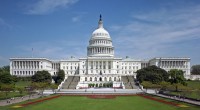The House unveiled five bills aimed at curbing Big Tech companies, including the Ending Platform Monopolies Act, that requires “structural separation of Amazon” and makes it illegal for an online platform to own a business that uses said platform for “the sale or provision of products or services,” that “sells services as a condition for access to the platform” or that “owns businesses that create conflicts of interest.” Another bill would ban platforms from giving advantage its own products and services over those of a rival.
The Wall Street Journal reports that the proposed legislation has support of some Democrats and Republicans, “with more expected to join.” Top Democrat on the House Antitrust Committee David Cicilline (D-Rhode Island) said, “unregulated tech monopolies have too much power over our economy,” and representative Ken Buck (R-Colorado), the panel’s top Republican, noted that the bill “fosters an online market that encourages innovation.”

At the Computer & Communications Industry Association, whose members include Amazon, Facebook and Google, president Matt Schruers countered that, “writing regulations for a handful of businesses will skew competition and leave consumers worse off.”
WSJ says that, “gaining sufficient Republic support for the bills will be an uphill battle,” because “many are skeptical about changing antitrust laws.” Cowan analyst Paul Gallant said the bills are “definitely in the doable range,” but that, “the gap between sounding tough at a hearing and actually voting for a breakup is significant.”
Another measure “would force online platforms to make their services interoperable with those of competitors” and a fourth bill “targets mergers, making it unlawful for a large platform to acquire rivals or potential rivals.”
Last, legislators also put forward a bill that would “raise filing fees for mergers valued more than $1 billion and lower them for transactions under $500,000,” generating “an estimated $135 million for antitrust enforcement in its first year.”
Four of the five bills “narrowly focus on big technology companies,” says WSJ, and the companies targeted by the bills “must have a market capitalization of $600 billion or more, must have more than 50 million active monthly users or 100,000 monthly active business users, and must be a ‘critical trading partner’ that has the ability to restrict or impede another business’ access to customers or services.”
Amazon, Apple, Facebook and Google are the only ones that meet those parameters.
The New York Times reports that some of the new bills before Congress are “likely to gain widespread support among lawmakers … but other bills will be harder to pass.” For example, one law would make it illegal for Google to “own another business that relied heavily on online search … [or] favor search results for its YouTube video service.”
Chamber of Progress head Adam Kovacevich said, “banning conveniences like Amazon Basics brand batteries, Apple’s Find My Phone tool or Google Maps appearing in Google search results are ideas that would spark a consumer backlash.” But New York University law professor Eleanor Fox countered that, “this is a reaction to the fact that our antitrust laws have been construed so narrowly by the Supreme Court.”
“Because of this problem, it is very appropriate for Congress to be stepping in to prohibit and determine what’s bad and what’s good for markets,” she said.

No Comments Yet
You can be the first to comment!
Sorry, comments for this entry are closed at this time.